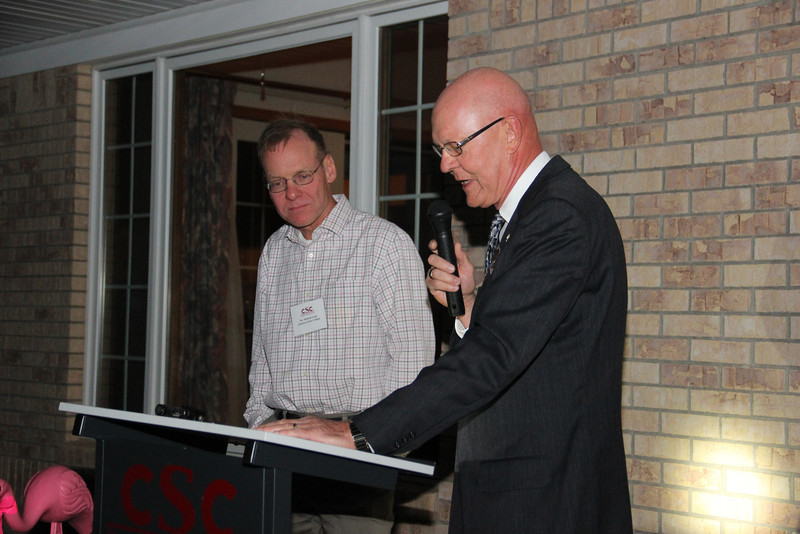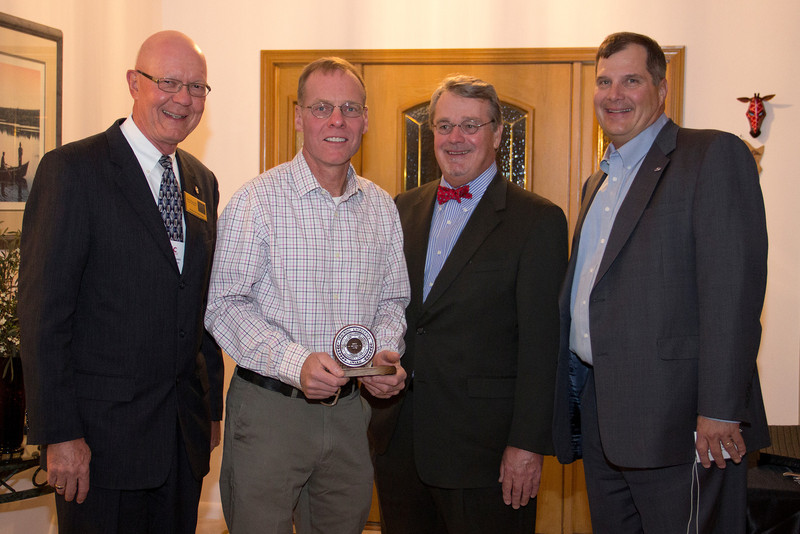NSCS award winner known for high-impact learning

A professor known for creating stimulating field experiences for students studying geosciences has been awarded the Nebraska State College System’s highest teaching honor.
The NSCS staff and board last week presented Dr. Mike Leite, Chadron State College professor of physical and life sciences, its NSCS Teaching Excellence Award during their annual visit to Chadron. It was presented during a dinner at CSC Interim President Dr. Randy Rhine’s residence on Thursday, Sept. 6.
Leite, who has served on the CSC faculty for the past 16 years, has been credited for leading the science department in revising its academic programs to create a comprehensive major in physical sciences with options in chemistry, physics and geosciences.
Those who nominated Leite for the honor said he has developed professionalism in students by engaging them in professional situations early in their academic career. He is known for creating hands-on field activities for students, and has received nearly $127,000 in grants to fund projects that include student research.
“Getting out in the field is absolutely essential to high-impact learning,” Leite said while accepting the award. “I’ve learned that the alternative to high-impact learning is no-impact learning. It’s really becoming a problem. Our students won’t listen to us and they don’t realize what’s important to their lives until it’s too late.”
Leite’s campus involvement includes service as a co-facilitator for the faculty learning community, which examined and made recommendations about CSC’s general education program. He also serves as faculty adviser for the Sigma Gamma Epsilon honor society for earth sciences.
Leite also has taken an active role in a number of national, state and regional organizations, including the Geological Society of America, the Society for Vertebrate Paleontology, National Science Teachers’ Association, the Nebraska Academy of Sciences, and the Prehistoric Prairies Discovery Committee. He also serves on the board and leads the collections committee for the Mammoth Site in Hot Springs, S.D.
Leite was chosen among nominees from CSC, Wayne State College and Peru State College. Stan Carpenter, chancellor of the NSCS, Gary Bieganski, member of the NSCS Board of Trustees, and Rhine presented the award. The award is accompanied by a $3,000 check from the Chadron State Foundation.
Leite became eligible for the NSCS honor by winning the CSC Teaching Excellence Award in May, which came with a $1,000 stipend from the Chadron State Foundation. Leite is a three-time winner of the CSC honor, also claiming it in 2001 and 2002.
He is the seventh CSC professor to win the NSCS award. Others were Dr. George Watson, justice studies, 1987; Dr. Lois Veath, physics, 1993; Dr. Charollene Coates, education, 1994; Dr. Patricia Cruzeiro, education, 1998; Dr. Barbara Limbach, business, 1999; and Dr. Robert Stack, mathematics, 2004.
Dr. Janie Park, who was CSC’s president during the presentation of the CSC award, said Leite is well-known for his “high-impact learning experiences,” and gave credit to his work on a number of special initiatives. They include the Eleanor Barbour Cook Museum of Geology, research trips to the active volcanoes and rain forests of Costa Rica, the study of ancient fossils at Toadstool Park and leading CSC’s P3 Team, which has examined the Chadron Creek watershed. He also has been actively involved in the faculty learning community for the new essential studies program.
“By sharing his own experiences with his faculty and colleagues, he’s extended his teaching excellence in new ways on the campus,” Park said.
Category: Campus Announcements, Campus News, Employee Awards & Achievements, Physical and Life Sciences

